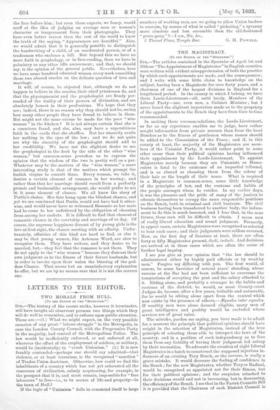THE MAGISTRACY.
[To THE EDITOR OF THE "SPECTATOR."] SIE,—The articles contained in the Spectator of April 1st and 29th on" The Appointment of Magistrates" in English counties, were written with evident misapprehension of both the practice by which such appointments are made, and the consequences ; and I write, with some little claim to knowledge on the subject, having been a Magistrate for over forty years, and a chairman of one of the largest divisions in England for a lengthened period. In the county to which I belong, we have three Lords-Lieutenant—all, until lately, Members of the Liberal Party—one, even now, a Cabinet Minister ; but I never heard the slightest imputation made as to the propriety of the appointments to the Bench they have from time to time recommended.
In making these recommendations, the Lords-Lieutenant,
so far as my experience enables me to judge, have rather sought information from private sources than from the local Benches as to the fitness of gentlemen whose names should be added to the Commission of the Peace ; and if, in this county at least, the majority of the Magistrates are mem- bers of the Unionist Party, it would rather point to some other cause than their political opinions having influenced their appointment by the Lords-Lieutenant. To appoint Magistrates merely because they are Unionists or Home rulers is fatal to the existence of an impartial tribunal, and is as absurd as choosing them from the colour of their hair or the length of their noses What is required in a Magistrate is common-sense, some little knowledge- of the principles of law, and the customs and habits of the people amongst whom he resides. In my earlier days, it was the pleasure and the pride of many of the juniors to educate themselves to occupy the more responsible positions on the Bench, both in criminal and civil business. The civil business having been transferred to another body, the induce- ment to do this is much lessened, and I fear that, in the near future, these men will be difficult to obtain. I mean men of really liberal education and sound judgment. Formerly, in appeal cases, certain Magistrates were recognised as selected to hear such cases ; and their judgments were seldom reversed. Now, on the first day of Sessions at least, there are often forty or fifty Magistrates present, docti, indocti. And decisions are arrived at in these cases which are often the cause of further legal inquiry.
I see you give as your opinion that "the law should be
administered either by highly paid officials or by wealthy men." Forgive my differing with you. The first would, of coarse, be some barrister of several years' standing, whose success at the Bar had not been sufficient to overcome the temptations of accepting the post and the salary attached to it. Sitting alone, and probably a stranger to the habits and customs of the district, he would, as most County-court Judges do, become, after a few years, irritable and autocratic„ for he would be sitting alone apart from the control which now exists by the presence of others,—..Equales inter :qualm If wealthy men were alone deemed eligible, many men of great intelligence and probity would be excluded whose services are of great value.
The mistake, pardon me saying, you have made is to admit for a moment the principle that political opinions should have weight in the selection of Magistrates, instead of the true principle of selecting those able to interpret the laws of the country, and in a position of such independency as to free them from any liability of having their judgment led astray by their necessities. To advocate the creation of eight Liberal Magistrates in a batch to counteract the supposed injurious in- fluences of an existing Tory Bench, or the reverse, is really a grave mistake. It would decrease the feeling of confidence in the Bench ; for the new Magistrates, whether Tory or Radical, would be recognised as appointed not for their fitness, but for their political opinions ; and the suspicion attached to their decisions would end not in increasing, but in decreasing, the efficiency of the Bench. I see that in the Parish Councils Bill it is provided that the Chairman of each District Council IS 'during his office to be a Magistrate. Here, this means an addi- tion of seventy Magistrates, who would be only in office for a limited period, and so create a difference in status among the Members of the Bench. Should these appointments, and the political ones you advocate, be made, I cannot but think that the day cannot be far distant when the duties of the un- paid Magistrates will have to be transferred to stipendary Magistrates ; saddling the counties with vast expenses, and creating tribunals whose manifest defects I have referred to [We entirely agree that the ideal plan is to disregard pail- 'cal considerations altogether. Unfortunately, the attempt to do this in practice fills the county Benches with men of one way of thinking. That we greatly regret, because it tends to prevent general confidence in the county Magistrates, and general confidence is essential to the exercise of their powers. —ED. Spectator.]







































 Previous page
Previous page